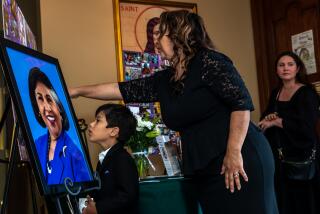Chou En-Lai’s Widow, Influential in Beijing Elite, Dies : China: Deng Yingchao, a veteran of the Long March, remained a strong voice after her formal retirement. Her death at 88 may weaken Premier Li’s base.
- Share via
BEIJING — Deng Yingchao, widow of former Premier Chou En-lai and an influential figure in China’s aging Communist elite, died Saturday of an undisclosed illness, official Chinese media said. She was 88.
A member of the policy-setting Politburo from 1978 to 1985, Deng retained a strong voice in China’s ruling councils even after her formal retirement. Her death may weaken the power base of hard-line Premier Li Peng, whose relationship with her was almost that of an adopted son.
Deng’s power and influence arose not only from her marriage to Chou, but also because she was one of only about 50 women to complete the 6,000-mile Long March of 1934-35. In that epic running battle, the Communist Party leadership and its army fled Nationalist forces to reach a haven in China’s northwest. From there they went on to win the revolution in 1949.
Deng met Chou when both were leading activists in the coastal city of Tianjin during the famous May 4th Movement of 1919, a student-led protest that was a key event in China’s revolutionary history. They married in 1925, the same year that she joined the Communist Party.
She remained a committed party member all her life, succeeding, like her husband, in maneuvering through all of its factional struggles without falling out of favor. Deng’s deepest feelings about the student-led pro-democracy protests that swept Beijing in the spring of 1989, and the massacre that brought them to an end, may never be known with certainty. But it appeared that she backed the use of the army to keep the ruling elders in power. After the Chinese army crushed the protests, the official newspaper People’s Daily quoted Deng as praising the soldiers with these words: “As an old member of the Communist Party, I thank you very much.”
An official obituary released Saturday called Deng “a great proletarian revolutionary and stateswoman, noted social activist, firm Marxist, outstanding party and state leader and a pioneer of China’s women’s movement.”
Through the course of their careers, both Deng and Chou were seen by many Chinese as honorable and decent figures who tried to do their best for China, even when the top leadership was engulfed in brutal infighting. Chou died in 1976, after years spent trying to temper the worst excesses of the radical 1966-1976 Cultural Revolution.
Students taking part in the 1989 Tian An Men Square demonstrations held a lingering affection for Deng, even though Premier Li was a key target of the protests.
The feeling was captured in a biting slogan painted on the side of a city bus parked in the square on May 24, 1989, at the height of the protests. “Mama Deng,” the slogan pleaded. “Quickly Bring Little Peng Home.”
Li Peng, son of a revolutionary martyr, was among a small group of war orphans whom Deng and Chou took direct responsibility for helping during the long war years. Many Chinese view this connection as the key reason Li holds high office today.
Deng was born in central China’s Henan province in 1904. Her father, a bankrupt landlord who had been a Qing Dynasty army officer, died when she was a child. Her mother worked as a schoolteacher and governess. After meeting and marrying Chou, she worked in the Shanghai underground.
In 1927, on the run from Nationalist police, Deng had an abortion late during a pregnancy. She then fled Shanghai and joined the revolutionary forces of Mao Tse-tung and Chu Teh at their base near the borders of Jiangxi and Fujian provinces. She remained childless the rest of her life.
The Long March began when Nationalist armies forced the Communists to abandon the base area set up by Mao and Chu. Deng, suffering from tuberculosis, survived only because she was carried much of the way on a stretcher.
As a young girl, Deng had been involved in the movement to abolish the traditional practice of binding women’s feet. After the Communists took power in 1949, she became a leading voice in party-controlled women’s affairs.
During the final decade of her life, Deng played a leading role in urging the Nationalist government on Taiwan--which the Communists view as a breakaway province--to enter negotiations for reunification with the mainland. She often noted that the Communists and Nationalists had twice before formed a united front, and urged that they do so again.
“Why shouldn’t we put the nation’s interests above everything else as we did twice before and work together to build our country by putting an end to the separation of our people?” she declared in a 1984 speech.
Deng continued to see visiting foreign dignitaries through 1990. Since last year, as her health faded, she dropped almost entirely from public view.
More to Read
Sign up for Essential California
The most important California stories and recommendations in your inbox every morning.
You may occasionally receive promotional content from the Los Angeles Times.













